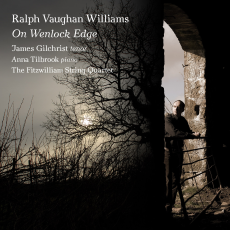Vaughan Williams - James Gilchrist - The Times with Richard Morrison
Finally, it seems, people have ceased being snooty about the "cowpat school" of English composers: those early 20th-century figures, such as Ivor Gurney, Vaughan Williams and Gerald Finzi, who persisted in writing lush, melodious music at a time when the progressives were turning gritty and discordant. That such composers are at last getting serious attention is largely thanks to champions such as James Gilchrist. The tenor may be featured at the Proms singing Austrian classics: Haydn's Seasons (Jul 23) and a Schubert Mass (Jul 25). But it's his new disc of English song that is winning critical acclaim.
It's a fine combination. There are two masterpieces - Vaughan Williams's On Wenlock Edge and Warlock's The Curlew ("unutterably miserable," says Gilchrist, "but I love it") - plus some Arthur Bliss and a real revelation: Ludlow and Teme, a Housman cycle by the tragic Ivor Gurney, the young composer gassed in the First World War trenches.
"Ludlow is belittled because it's obviously inspired by Wenlock Edge," Gilchrist says. "Gurney heard the latter and clearly thought: ‘Hmm, this combination of string quartet, piano, voice and Housman works'. But it, too, is a fabulous, magical piece."
This is the third disc of 20th-century English songs that Gilchrist has done. It follows his superb CD of all Finzi's songs, and a revelatory collection of haunting songs by the little-known John Jeffreys. How does Gilchrist account for the growing popularity of these melodists after decades of neglect? "It may be to do with the wistfulness in this music and poetry," he says. "In Hardy and Housman, especially, there's a consciousness of having lost something precious that wasn't valued at the time. That chimes with our feelings today about the countryside: the sense that our relationship with nature has become flawed."
Gilchrist is a interesting figure. A boy chorister in Oxford, then a choral scholar at King's, Cambridge, he put singing aside to study medicine, and worked as a doctor for three years before succumbing to the lure of performance. Ardent and intelligent, he's in demand. But does he ever regret dumping medicine? "Yes. Hugely, sometimes. In medicine it's very easy to see that you are doing something valuable and helpful for society. I profoundly believe that art is valuable, too. But you sometimes don't get that impression in our utilitarian society." Music-lovers surely won't share his regret. There are lots of fine doctors. But as an interpreter of English song, Gilchrist is often in a class by himself.

